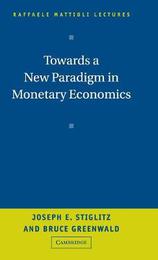
|
Towards a New Paradigm in Monetary Economics
Hardback
Main Details
| Title |
Towards a New Paradigm in Monetary Economics
|
| Authors and Contributors |
By (author) Joseph Stiglitz
|
|
By (author) Bruce Greenwald
|
| Series | Raffaele Mattioli Lectures |
|---|
| Physical Properties |
| Format:Hardback | | Pages:344 | | Dimensions(mm): Height 216,Width 140 |
|
| Category/Genre | International economics |
|---|
| ISBN/Barcode |
9780521810340
|
| Classifications | Dewey:332.4 |
|---|
| Audience | | Professional & Vocational | |
|---|
|
Publishing Details |
| Publisher |
Cambridge University Press
|
| Imprint |
Cambridge University Press
|
| Publication Date |
4 September 2003 |
| Publication Country |
United Kingdom
|
Description
Towards a New Paradigm for Monetary Economics presents a pioneer treatment of critical topics in monetary economics. Unlike the prevailing monetary theory, this book focuses not on the role of money in facilitating transactions, but on the role of credit in facilitating economic activities more broadly. The 'new paradigm' emphasizes the demand and supply of loanable funds, which in turn requires the understanding of the imperfections of information and the role of banks. One enlightening view is that credit is quite different from other commodities in the sense that the former is based on information and default risk. The book consists of two parts. The first part develops a basic model of credit based on banks' portfolio choices. The second part is dedicated to the policy implications, among which are the liberalization of financial markets, the East Asian Crisis, the 1991 US recession and the subsequent recovery.
Author Biography
Professor of Economics, Stanford University and Senior Research Fellow of Brookings Institution. Formerly Senior Vice President and Chief Economist at World Bank. Professor of Finance, Columbia Business School.
Reviews'... recommended reading for all monetary economists and practitioners alike.' International Affairs 'Overall this is an excellent contribution to our understanding of the functioning of modern financial markets. It will become essential reading for students, researchers, practitioners and policy-makers with an interest in the behaviour of monetary and financial systems.' Journal of International Development
|